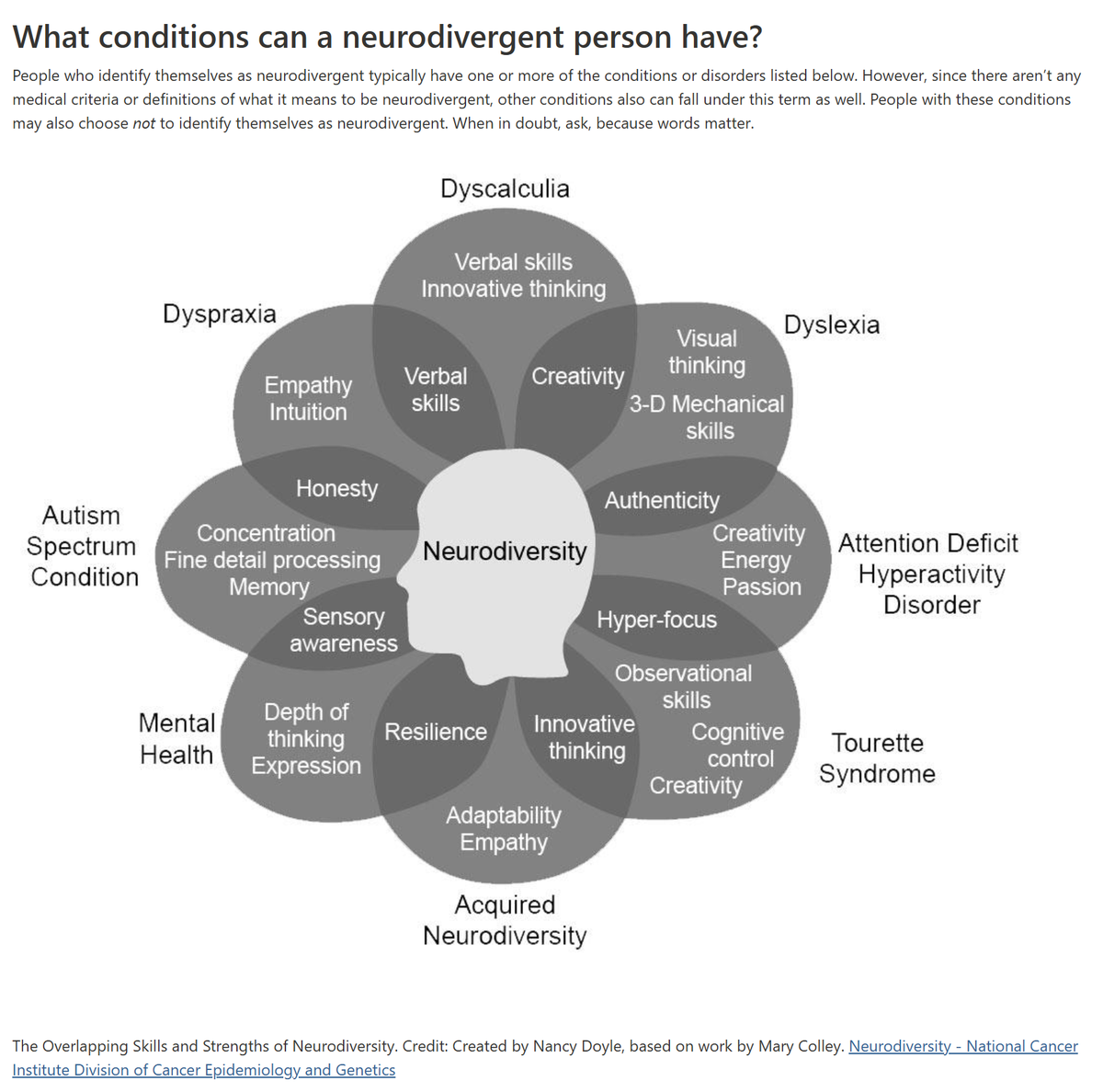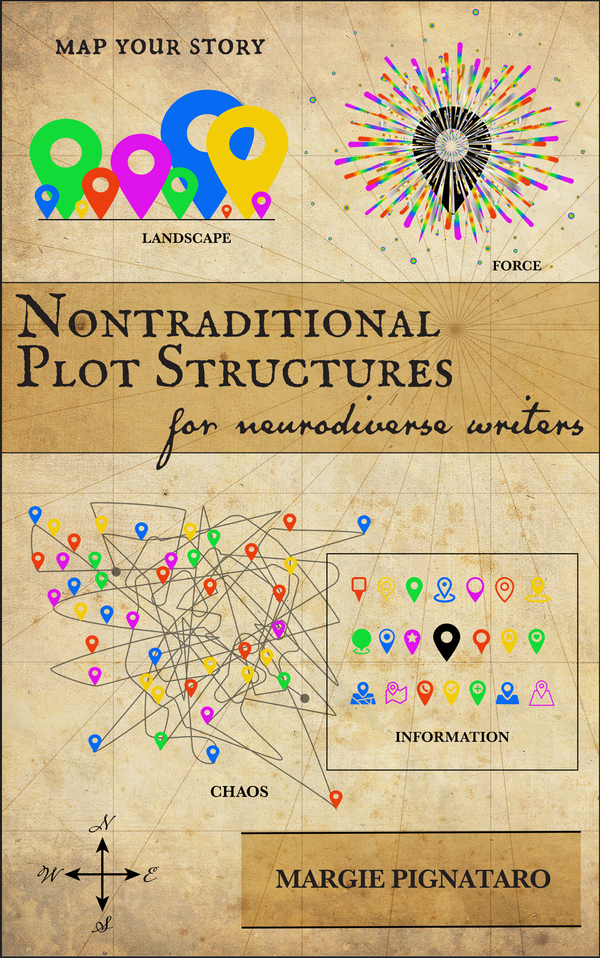25 Struggles and Myths Neurodivergent Authors Face
1. Respect the structure of your brain. Your brain will only work the way it is structured to work. Forcing it to work another way will only cause stress, anxiety, and failure.

with some writing advice thrown in
I have auDHD and I've struggled with these issues. Since I was 16, I’ve struggled to understand my writing habits and anxieties. When I found myself in a graduate program with other playwrights, I realized what I experience while writing is vastly different than what other people experience. Looking back, I can recognize the few writers that were most likely neurodivergent because of the kinds of plays they wrote and how they wrote them.
There is current debate about PTSD, CPTSD, and neurodivergence. Not only why so many more neurodivergent people have it versus neurotypical, but whether or not PTSD and CPTSD are a type of acquired neurodivergence. There is quite a lot of overlap of symptoms with PTSD, CPTSD, and various neurodivergent conditions. In my own experiences, my CPTSD/PTSD (yes, both, I've had quite a life) have impacted my writing. I'll include in my list points related to CPTSD and PTSD.
I’ve gathered information from a number of online sources, as well as doing research using ChatGPT (not to write anything for me, but only to find raw data quickly). At the end will be an infodump of sources and informative PDF’s about ADHD and autism.
- Respect the structure of your brain. Your brain will only work the way it is structured to work. Forcing it to work another way will only cause stress, anxiety, and failure.
- Failure is good; failure is education; education makes you stronger.
- CPTSD and PTSD triggers: be extremely cautious. Writing about personal trauma can be helpful. It can also retraumatize. When I have written about traumatic experiences autobiographically, it has been difficult, but manageable. When I became overwhelmed, I stopped. I know I'll pick it up eventually, but there's no rush and I don't want to write right now. When I have written about traumatic events fictionally, it's been disastrous and the subject of another post. I think the primary reason why is because I didn't realize I was writing about myself and my trauma. I was so deep into the stories and characters, that I saw myself as a stenographer taking dictation, distant and unmoved. If you want to write about your trauma, be very conscious you're doing so. If you're writing fiction and don't think you're writing about trauma, look again at your text. If you start feeling anxiety, have trouble sleeping, having intrusive thoughts that are centered in your story, back away and discuss it with a therapist.
- If you lose track, stop. If you're overwhelmed, step away. If you forget requirements, keep notes. Always keep notes. Forget about editing matters until you're done. Remember: there is absolutely no rush. If you have a story, your brain will hold onto it. If you forget, going back over what you wrote or notes you have will remind you. If not, give it time.
- ADHD writers think and experience life through distractions. Follow your distractions as you write. Maybe they aren't "distractions": perhaps the whole picture moves as fast and wildly as water rapids.
- ADHD requires stakes and urgency; you write when you MUST. Procrastination is your superpower: put off writing until you have no choice but to work. Think only about the story. Resist as long as you can. When you do write, attempt to stop before everything is gone. Leave something left. Don't eat everything; leave leftovers. If you have a thousand ideas, write one or two down and then think about the others. If you can't remember an idea, it may not have been that great to begin with. If it was, you'll think of it again.
- There is no shame in being neurodivergent. Neurotypicals who say or do anything to shame you can go fuck themselves.
- Sometimes, pieces need to be abandoned. It's no loss. Sometimes pieces finish before you think they should. Sometimes a story is made up of fragments.
- Don't force yourself to do what neurotypicals do and how they do it. Discover how you work.
- You have your own voice and flair that is unique and interesting; I don't need to read what you write to know that. Over time, it will grow and evolve.
- Autistic writers can seem formal, too abrupt, too organized, having difficulty with metaphors and figurative language. Who cares? Writing the way that is natural for you says something important about you and what you're writing about.
- Write what you want and be honest about it (if you want to write like neurotypicals, accept it'll be difficult).
- If something feels important to you, it is important. If going on a tangent feels important, do it. If jumping around from one subject to another feels right, do it. These things feel important for a legitimate reason. They are not the products of neurological disorder. The trick is understanding why they are important.
- You cannot appeal to everyone all of the time. There will be readers who think your work is boring. I had an audience member tell me to my face that they hated my play. I discovered in that moment that I didn't care. I had a dozen others tell me they loved it. The dozen are important. The one (and probably others) don't get anything from my work and it puts them in an uncomfortable place. I actually think that's more interesting than the ones who loved my play. Hate is such a strong reaction; what was his deal? What about my work caused him to react so viscerally?
- You're different, not disordered. You're not an apple: you're an orange. Oranges need to write stories about what it's like being an orange.
- Embrace punctuation: use it how you want; if you want to have a colon and two semi-colons in one sentence, go for it; punctuations reflect how you think and experience the world.
- My husband always tells me, "Don't do what you think you should do. Do what you want to do." Figuring what I want to do, having been trained to mask and hide my emotions most of my life, is really difficult. Behind the masks I've let myself do what I want. Only in recent years have I allowed myself to remove the masks.
- Write as if you're speaking to a neurodivergent audience who understands the way you think and thinks the same way themselves. Writing for a neurotypical audience is tricky. Neurotypicals don't write for us and yet they expect us to appreciate what they write even when it's alienating and boring.
- Forget about logic, organization, plans, structure, and question most writing advice. (Except for this entire list and my free ebook; read my book because it's about all this stuff and nontraditional plot structures.)
- We always have some kind of schedule in mind when we write, as if the New York Times is urgently awaiting our manuscripts to put on their best seller lists. Writing can take a long time. There's no rush. You'll get there. If you have to stop and put something away for months or years, that's cool.
- Every time I finish one project, I immediately start something else. I have multiple projects going at once. Some of those projects are in fragments that I'm not sure what to do with. Creativity isn't organized: it's a hurricane.
- If it doesn’t come out, if you don’t end up writing, that’s okay, too.
- Perfectionism is poison. It is a common result of childhood trauma. Neurodivergent people are more likely than anyone to suffer from CPTSD and PTSD. As a child, I learned that I had no choice but to be good and excel in school, no matter what it cost me, because the consequences were dire. This will fuck you up as a writer. You cannot just let it go. It's something to address in therapy.
- Most of all: you're writing for one audience and that's you. Write to entertain and fulfill and move yourself. Write because it's joy and fun and it makes you feel good about yourself. If your work pleases yourself, it will please others.
- There are more really good writers than bad writers. Kurt Vonnegut observed this in his introduction to the book In the Realms of the Unreal: Insane Writings. It's a collection of writings written by people in a psychiatric hospital.
SOURCES
(provided by ChatGPT)
📖 Sources on ADHD + Writing Challenges
Mayes, S. D., & Calhoun, S. L. (2007). Learning, attention, writing, and processing speed difficulties in ADHD subtypes. Journal of Attention Disorders, 11(6), 664-673.
Zentall, S. S. (1993). Research on the educational implications of attention deficit hyperactivity disorder. Exceptional Children, 60(2), 143–153.
ADHD Foundation Neurodiversity Charity. (n.d.). ADHD and writing skills. (https://www.adhdfoundation.org.uk)
---
## 📖 **Sources on Autism + Writing Challenges**
* American Speech-Language-Hearing Association (ASHA). (n.d.). *Written language disorders in autism.* [https://www.asha.org](https://www.asha.org)
* Carnahan, C. R., Williamson, P., & Christman, J. (2011). *Linking literacy and self-determination for students with autism spectrum disorders.* Intervention in School and Clinic, 46(3), 179-185.
* Attwood, T. (2007). *The Complete Guide to Asperger’s Syndrome.* London: Jessica Kingsley Publishers. (chapter on written expression)
Helpful Websites
https://www.healthychildren.org/English/health-issues/conditions/adhd/Pages/ADHD-and-Homework.aspx
https://medlineplus.gov/autismspectrumdisorder.html



